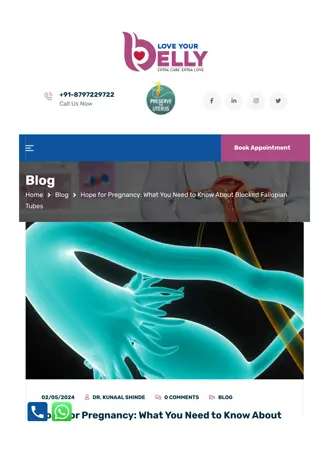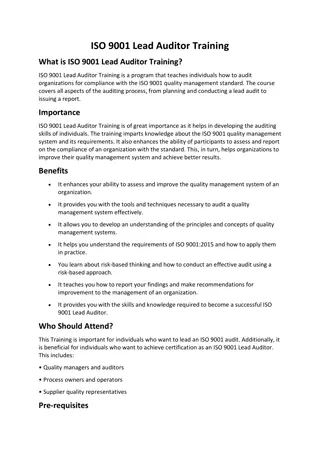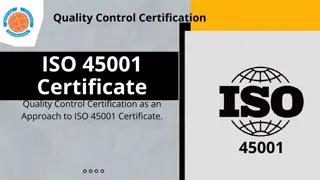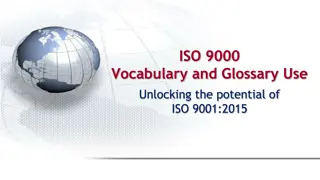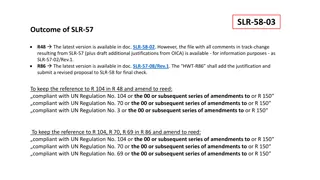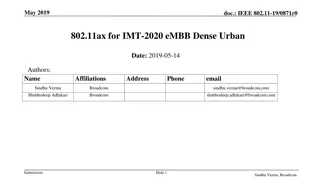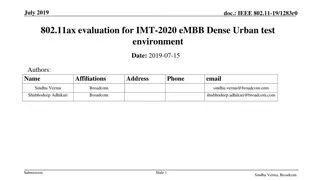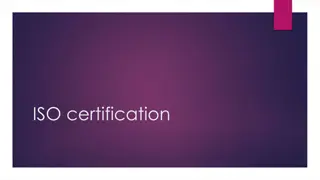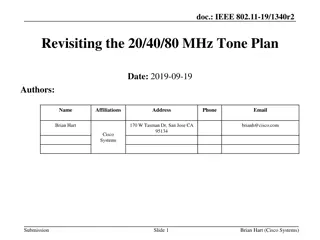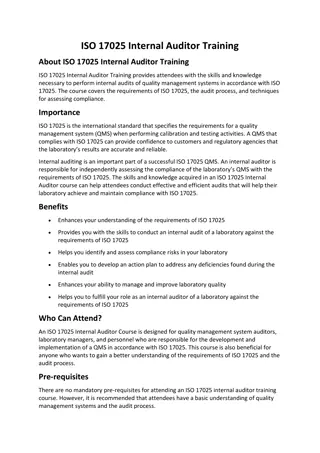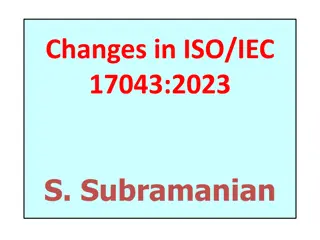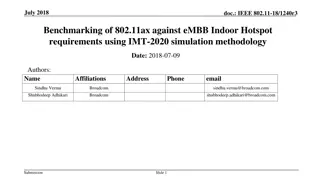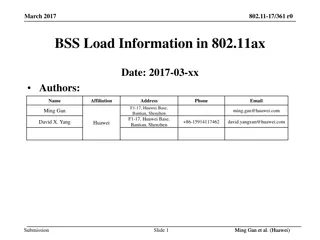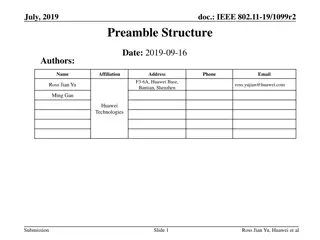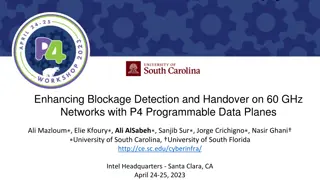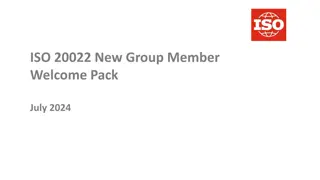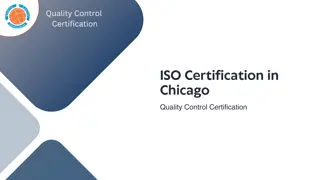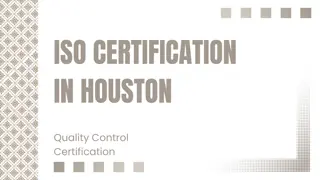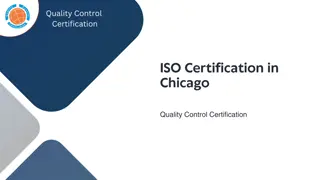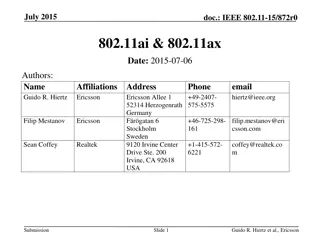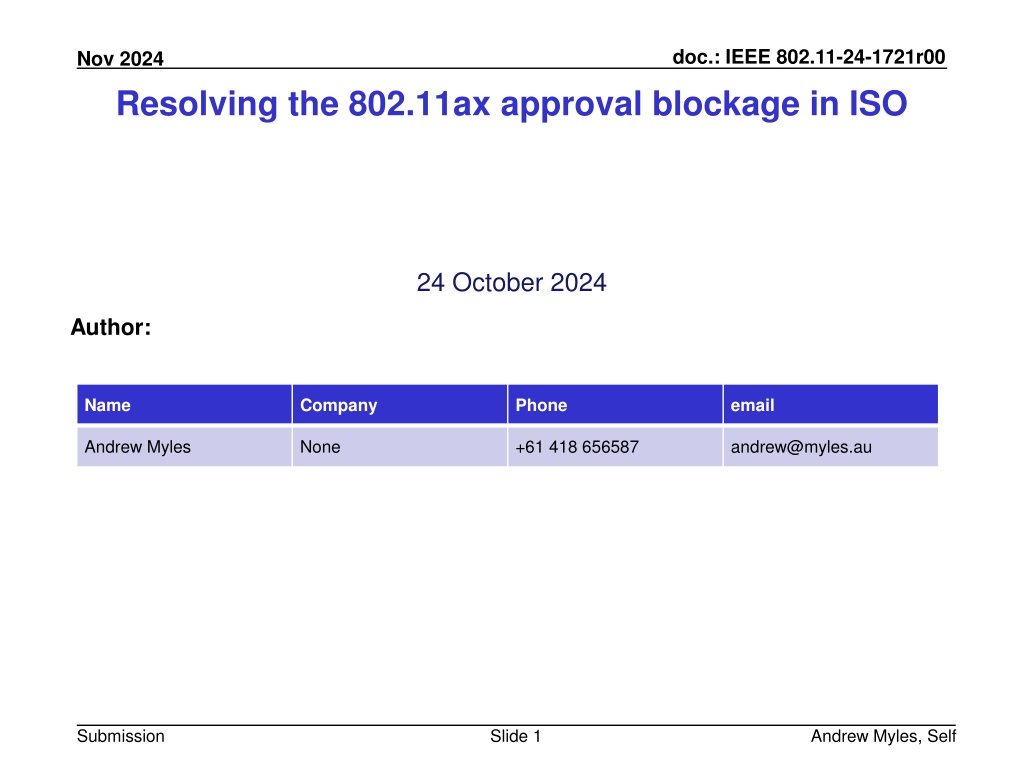
Resolving IEEE 802.11ax Approval Blockage in ISO
Discover how Andrew Myles proposes a mechanism to overcome the approval blockage of IEEE 802.11ax as an ISO standard due to an IPR issue. Learn about the challenges faced, the proposed solutions, and the collaboration between IEEE and ISO over the years to ensure international recognition of standards.
Download Presentation

Please find below an Image/Link to download the presentation.
The content on the website is provided AS IS for your information and personal use only. It may not be sold, licensed, or shared on other websites without obtaining consent from the author. If you encounter any issues during the download, it is possible that the publisher has removed the file from their server.
You are allowed to download the files provided on this website for personal or commercial use, subject to the condition that they are used lawfully. All files are the property of their respective owners.
The content on the website is provided AS IS for your information and personal use only. It may not be sold, licensed, or shared on other websites without obtaining consent from the author.
E N D
Presentation Transcript
doc.: IEEE 802.11-24-1721r00 Nov 2024 Resolving the 802.11ax approval blockage in ISO 24 October 2024 Author: Name Company Phone email Andrew Myles None +61 418 656587 andrew@myles.au Submission Slide 1 Andrew Myles, Self
doc.: IEEE 802.11-24-1721r00 Nov 2024 This presentation proposes a mechanism to restart the approval of 802.11ax as an ISO/IEC/IEEE standard In August 2021, an IPR related problem caused the processing of IEEE 802.11ax as an ISO/IEC/IEEE 8802 standard to halt In January 2023, after 1.5 years of attempting to resolve the issue, I stepped down as Chair of the IEEE 802 JTC1 SC In June 2024, I was very disappointed to discover that the IPR problem had still not been resolved and so I published a series of blogs (on LinkedIn) about the problem & a variety of possible solutions June 2024: ISO needs to act July 2024: 802.11ax related patent declarations to ISO are required! Aug 2024: ISO needs to follow its own patent policy! This presentation to IEEE 802 JTC1 SC outlines a proposal for IEEE 802 to progress at least one of the proposed solutions Submission Slide 2 Andrew Myles, Self
doc.: IEEE 802.11-24-1721r00 Nov 2024 IEEE 802 has worked with ISO for many years to ensure its standards are recognised as international IEEE 802 standards are not recognised by everyone as international standards which can cause practical difficulties in some markets! IEEE 802 has dealt with this issue pragmatically by working with ISO to have IEEE 802 standards approved as ISO/IEC/IEEE 8802 series international standards Various approval mechanisms have been used by ISO over the years .. but currently the approval process is guided by an agreement between ISO & IEEE-SA called the PSDO agreement IEEE 802 std 802.1 802.3 802.11 802.15 802.21 802.22 ISO approved 50 32 13 3 3 4 This approach has worked pretty well for more than 20 years More than one hundred IEEE 802 series standards have been approved as ISO/IEC/IEEE 8802 series standards Submission Slide 3 Andrew Myles, Self
doc.: IEEE 802.11-24-1721r00 Nov 2024 The ISO approval of IEEE 802.11ax as an international standard was held up in late 2021 by an IPR issue In late 2021, the ISO approval process for IEEE 802.11ax as an ISO/IEC/IEEE international standard was held up by an IPR issue after four ISO National Bodies noted declarations to IEEE SA asserted some claimed IPR owners were unwilling to provide RAND licences The NBs were Sweden, Finland, Germany & Japan The declarations were from were Ericsson (Sweden), Interdigital (USA), Panasonic (Japan), Huawei (China), KPN (Netherlands), Nokia (Finland) ISO used the declarations to IEEE SA (made against the IEEE SA Patent Policy) as a hint that there might be problem under the similar (but different) ISO Patent Policy which does not allow ISO standards to contain IPR where the patent holders are unwilling to provide free or RAND licenses (as defined by the ISO Patent Policy) Submission Slide 4 Andrew Myles, Self
doc.: IEEE 802.11-24-1721r00 Nov 2024 The ISO rules outline a process when there is a concern about IPR in a proposed standard A concern is expressed to ISO or by ISO about IPR in a proposed standard Note: Item 3 in the Guidelines for Implementation of the Common Patent Policy for ITU- T/ITU-R/ISO/IEC specifies that the IPR holder has to provide a written statement to be filed at ITU- TSB, ITU-BR or the offices of the CEOs of ISO or IEC, respectively, using the appropriate form. ISO requests possible IPR holders to make declarations on "Patent Statement and Licensing Declaration" Form. Option 1 Willing to provide free license Option 2 Willing to provide a RAND license Option 3 Not willing to license The proposed standard can progress The proposal can only progress if the specified IPR is excluded In the case of Option 3, the patent holder is required to provide detailed information about the patent Submission Andrew Myles, Self Slide 5
doc.: IEEE 802.11-24-1721r00 Nov 2024 ISO TPM staff did not follow their rules when dealing with the IPR concern related to 802.11ax A document (6N18159, dated Dec 2023) submitted by ISO TPM (Technical Program Management) staff to ISO/IEC JTC1/SC6 indicates the process that was followed in relation to 802.11ax ISO TPM staff received the IPR concerns about 802.11ax & wrote to the alleged IPR holders who may (or may not) have responded None of the alleged IPR holders responded on the appropriate form (as no form has been uploaded to the ISO patent declaration database) ISO TPM staff then ruled that an email refusal, patent declaration form Option 3 filed, or no response from the alleged IPR holders were all equivalent to Option 3 The ISO TPM staff position is contrary to the Guidelines for Implementation of the Common Patent Policy for ITU-T/ITU-R/ISO/IEC Email refusal/no response doesn t provide information about the IPR that is claimed and so it is not possible to know if it is even relevant or determine if it can be avoided Slide 6 Submission Andrew Myles, Self
doc.: IEEE 802.11-24-1721r00 Nov 2024 It will likely take some time to persuade ISO to follow ISO s patent rules in relation to 802.11ax approval The ideal way to progress the approval of 802.11ax as an ISO/IEC/IEEE standard is for ISO TPM staff to follow ISO s rules ISO should deem a refusal by alleged IPR holders to use the appropriate form as an indication there is no IPR related issue for 802.11ax If there is no IPR related issue for 802.11ax the process defined by the PSDO agreement can proceed However, it is likely to take some time to persuade ISO TPM staff (or ISO more generally) that their current position is incorrect It is unclear who should be negotiating with ISO TPM staff, eg IEEE 802, IEEE SA staff, ISO NBs, It is unclear that ISO TPM staff are the appropriate authority within ISO It is human nature that people will take time to budge from an initial position It seems likely that another approach is required to unblock the ISO approval process for 802.11ax in the short to medium term Submission Slide 7 Andrew Myles, Self
doc.: IEEE 802.11-24-1721r00 Nov 2024 802.11ax approval can restart if we can persuade the six companies to submit declarations to ISO It is suggested, as an alternative, that IEEE 802 take the initiative: Write directly to each company that has submitted a negative LoA to IEEE SA wrt IEEE 802.11ax (as documented in IEEE SA s LOA database) requesting they submit an IPR declaration to ISO on the appropriate form or indicate to IEEE 802 that they will not do so by 15 Jan 2025 (for consideration at the IEEE 802 JTC1 SC meeting) The purpose of this suggestion is to enable a possible faster path: A declaration with Option 1 or Option 2 will immediately unblock the process A declaration with Option 3 will enable IEEE 802 to consider alternatives (a much longer process) Any refusal to provide an explicit declaration to ISO will open up other PR or legal alternatives and will emphasise the importance of asking ISO to follow their own rules A draft for the suggested letter from IEEE 802 to the six companies is in 11-24-1722r0 Slide 8 Submission Andrew Myles, Self

